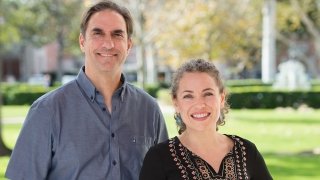USC Rossier’s Master of Arts in Teaching English to Speakers of Other Languages (MAT—TESOL) program has evolved over the years from a more theoretically oriented program to a practitioner-focused teacher training model. This reflects larger developments in the field, according to Clinical Education Professor and program chair Rob Filback and Associate Professor Jenifer Crawford.
“Language education is on the cusp of huge change: a massive shift in policy, practice, curriculum and pedagogy,” Crawford says. “Our challenge is to make the field’s ideas practical and concrete, so that our diverse students can enact them in their classrooms. That’s the future.”
WHAT IS THE STATE OF MULTILINGUAL EDUCATION?
ROB FILBACK: There are encouraging trends, like the growth of immersion programs, but at the same time the Chronicle of Higher Education reported that, from 2013 to 2016, higher ed closed 651 foreign-language programs. That’s disheartening, especially with estimates that, by 2025 in the U.S., one in four public K–12 students will be an English language learner.
JENIFER CRAWFORD: There are glimmers of hope. The idea of subtractive bilingualism—that somehow being bilingual before college is negative—has long influenced education policies. But that’s started to change with the idea of additive bilingualism coming down to K–12 and before. LAUSD did a two-year pilot with district-supported, dual-immersion preschools on elementary school campuses. They educated 227 students, and now 27 schools or so have joined the program’s wait list.
WHAT IS DEFINING USC ROSSIER’S RESPONSE?
JC: A real sense of urgency. Seeing what’s been happening around immigration makes us want to redouble our efforts.
RF: We just went through a process to identify the three new pillars of our program: effective language teaching, critical inquiry and social justice. Educational justice is not just something we’re discussing, but one of the main things we want our graduates to be known for.
JC: Rob and I are living this, not just as teacher-educators, but also as parents who both have kids exploring questions of language and seeing themselves as multilingual.
RF: We’re highlighting our World Masters in Language Teaching program, which has partnerships with universities in China, Korea and Mexico. It’s an innovative dual master’s program that immerses students culturally and prepares them to teach two different languages. It’s another way we’re supporting language learners and redefining what language education is around the world.
WHAT INSPIRES YOUR SCHOLARSHIP AND ADVOCACY?
RF: Having been raised monolingually and monoculturally, I’m on a careerlong campaign to promote multilingualism and a more empowering playing field for language learners, both for my kids and for any students who have been disparaged or marginalized linguistically.
JC: Remembering that we’re all language learners, and we should never stop. Both Rob and I still take language classes and learn from our students. It’s never too late, and it expands how we understand the world and one another.






